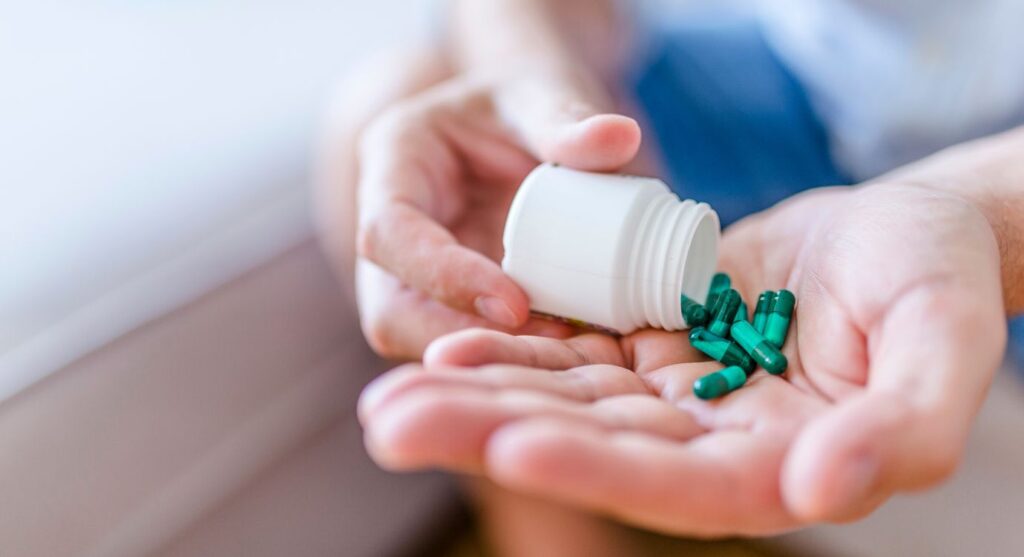Free delivery on all orders over £45
Free delivery on all orders over £45

Medically reviewed by
CBD is considered safe to use for most people.
But this doesn’t mean there are no risks.
When it comes the question: “Can CBD oil interact with medications?”, things get a bit complicated.
Yes, CBD is a natural compound – but this doesn’t afford it a no-risk, all-areas access pass. And it’s crucial you’re aware if you plan to consume CBD oil: even the sustainable, ethical, organic CBD may interact with medications.
Why would CBD interact with my medications? What does this mean exactly?
Well, it’s due to the risk that CBD could alter the way your body metabolises medications – but more on this later!
You can probably guess the advice we’re going to give at this stage: never assume blanket safety. Always check with your GP or pharmacist if you’re looking to take CBD for the first time.
Let’s have a look at the following:
The short answer is yes – CBD oil can interact with medications.
As mentioned above, CBD can change the way your body metabolises medication, which could potentially impact the efficacy of the medicine.
This includes both prescription and over-the-counter medications. CBD can also affect how your body breaks down other supplements and vitamins.
Concerningly, this is still a little-known fact. Since CBD is relatively new to the market, it’s often not mentioned in the precautions section of patient information leaflets or properly explained on product labels.
10% off on your first order
Complete this one-minute quiz and find the right products for you.
To understand how CBD products can impact other medications, we first must understand how medications, supplements and vitamins are broken down in our bodies.
Every time you take a medication or supplement, your body has to break it down and eliminate it. This process starts in the gut and ends in the liver.
Read more: Is CBD bad for your liver?
Your metabolism determines how fast this process will be. Some substances can impact the speed at which you metabolise medications.
The risk is that if you take longer to process a medication, then it can build up in your system. And, if you metabolise medications too quickly, they might not have enough time to be effective.
Let’s explore the science for a quick minute.
The reason that CBD may affect your medications is all to do with a family of enzymes called cytochrome P450 (CYP450). These enzymes break down foreign substances and remove them from the body.
CBD inhibits CYP3A4, which is an essential enzyme from the CYP450 family. The CYP3A4 enzyme is responsible for metabolising around 60% of prescribed medications.
So, taking CBD with other medications can slow down the rate at which you break down and eliminate that medication. If this happens, you will have more medication in your bloodstream than you should, even if you stick to your usual dose and schedule.
The reverse is also possible. Your body needs CYP3A4 to break down CBD, but some medications can inhibit this enzyme.
When this happens, CBD sticks around in your system for longer than it initially would.

If you get the go-ahead from your GP to use CBD products alongside other medications, you should be aware that the interaction of your medication and CBD may, in some cases, cause side effects.
Side effects to look out for include
If you notice any of the following, we’d advise you to stop using your CBD, and closely monitor how your body responds.
“What drugs shouldn’t I take with CBD? And how on earth am I going to know?”
We can’t emphasise enough that you should speak with a medical professional in these circumstances.
However, a simple way to determine if your medication is likely to interact with CBD is to look for the grapefruit warning.
Okay, we know this sounds a bit made up, but trust us.
If your medication recommends limiting your intake of grapefruit and other citrus fruits – such as Seville oranges, pomelos and tangelos – there is a good chance it will also interact with CBD.
It’s also worth noting that topical CBD products like CBD skin creams, lotions, balms, shampoo and other topical products should not have the same impact, as little CBD generally makes it into your bloodstream.
If you’re using CBD muscle balm for joint pain, you shouldn’t worry – it’s highly unlikely this will cause interaction with other medications.
Read more: CBD for pain relief
As we’ve outlined above, CYP3A4 is responsible for metabolising around 60% of all prescribed medications.
CBD is thought to interact with the following types of medications:
All of the following also fit into the grapefruit warning category – if you are prescribed any of the below, CBD should also be avoided – unless you have express permission from medical professionals and reactions are being clinically monitored:

So, in summary to our question: “Can CBD oil interact with medications?” – the answer is yes!
Despite common perception that CBD is completely harmless, it’s clear that when it comes to CBD and medication – knowledge is power.
It’s entirely understandable that people taking medications for long term or chronic conditions might want to try CBD. But in some cases this could do more harm than good.
On the other hand – we’re not looking to be alarmist. Just because CBD might interact with medications it doesn’t mean that this is automatically incredibly dangerous.
More research is needed to understand the implication of CBD interaction with medication.
As such, it could be a long time before researchers have determined which medications are safe to use with CBD, which require additional supervision, and which should not be mixed.
Until then, if you’re taking other medications, we’d advise to steer clear of CBD products until you have the all-clear from your GP or pharmacist.
Sign up for the Evopure newsletter:
This product is not for use by or sale to persons under the age of 18. It should not be used if you are pregnant or nursing. Consult with a physician before use if you have a serious medical condition or use prescription medications. A Doctor’s advice should be sought before using this and any supplemental dietary product. This product is not intended to diagnose, treat, cure or prevent any disease.
© Evopure Ltd. All rights reserved Terms & Conditions Cookie Policy Sitemap